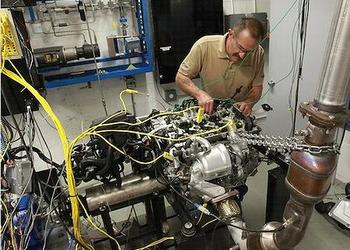
WASHINGTON, DC, September 11, 2013 (ENS) – The Obama Administration is investing more than $45 million in 38 vehicle technology R&D projects to boost fuel efficiency, lower transportation costs, and protect the environment nationwide.
Energy Secretary Ernest Moniz announced the new grants, saying, “By partnering with universities, private industry, and our national labs, the Energy Department is helping to build a strong 21st century transportation sector that cuts harmful pollution, creates jobs, and leads to a more sustainable energy future. By improving the fuel economy of our cars and trucks, we can save families and businesses money at the pump and better protect our air and water.”
The 38 projects span five major areas critical to advanced transportation technologies – lightweighting and propulsion materials, affordable, efficient batteries, power electronics, fuels and lubricants, as well as efficient heating, ventilation, and air conditioning systems.

(Photo by Xin He courtesy National Renewable Energy Lab)
Through the Advanced Vehicle Power Technology Alliance between the U.S. Energy Department and the U.S. Army, the Army is contributing $3 million in co-funding to support projects focused on lightweighting and propulsion materials, batteries, fuels, and lubricants.
“Working with the Energy Department, we are accelerating the development and deployment of cutting-edge technologies to strengthen our military, economy, and energy security,” said Dr. Paul Rogers, director the U.S. Army Tank Automotive Research, Development, and Engineering Center.
One grant of just over $3 million is Envia of Newark, California. Their scientists will develop high-energy lithium batteries for plug-in electric vehicles by pairing high capacity manganese rich cathodes with high capacity silicon/carbon based nanocomposites.
The largest number of funded projects, 15, are in the area of advanced lightweighting and propulsion materials, and they will receive a total of $10.2 million.
These scientists will research lightweight materials, such as advanced high-strength steel, magnesium, and aluminum that allow automakers to build in electric drive components, electronic systems, and emissions control equipment without increasing vehicle weight.
Cutting a vehicle’s weight by just 10 percent can improve fuel economy by six to eight percent, and the Energy Department says next generation lightweight materials can reduce passenger car weight by half.
Advanced battery projects will get the next largest number of funded grants; 13 projects will share $22.5 million. These projects aim to cut battery size and weight in half, while improving efficiency and performance.
In the last four years, the cost of a plug-in electric vehicle battery has dropped by nearly 50 percent. To further reduce costs, the new funding aims to improve cell chemistry and composition, develop advanced electrolytes, and create new battery design tools.
Four power electronics research projects will share $8 million and will contribute to reducing the cost of a plug-in electric vehicle inverter by more than 30 percent, said the Energy Department.
Another four projects will share $2.5 million to research and develop advanced fuels and lubricants that can reduce friction losses and increase the efficiency of cars already on the market and next generation passenger vehicles.
The final two funded projects are in the heating, ventilation, and air conditioning field. Two projects will share $4 million to develop innovative heating and cooling technologies that reduce battery demands and improve driving range by 20 percent to 30 percent.
These newly funded projects support the goals of the Energy Department’s EV Everywhere Grand Challenge, which aims to make plug-in electric vehicles as affordable and convenient to own and drive as today’s petrol-powered vehicles within 10 years.
Click here for a full list of the 38 funded projects.
Copyright Environment News Service (ENS) 2013. All rights reserved.
© 2013, Environment News Service. All rights reserved. Content may be quoted only with proper attribution and a direct link to the original article. Full reproduction is prohibited.
